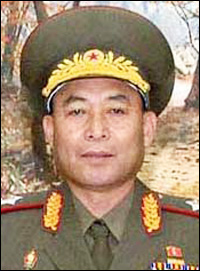N. Korean military chief relieved
North Korea said Monday it had relieved military chief Ri Yong-ho, a key aide to leader Kim Jong-un, of all his posts due to “illness” ― a move likely to significantly impact Pyongyang’s power structure.
The news raised eyebrows as Ri, 69, had been among the top of a small coterie of elite officials guiding Kim following the death of his father Kim Jong-il last year, holding the positions of vice minister of the Central Military Commission and being a member of the Presidium of the Political Bureau.
Ri was also vice marshal and chief of the General Staff of the Korean People’s Army (KPA), making him the military’s number two behind Kim.

“A meeting of the Political Bureau of the Central Committee of the Workers’ Party decided to relieve Ri Yong-ho of all his posts due to illness,” the North’s Korean Central News Agency said in a dispatch.
In the past, “illness” has been used in the North’s media to denote dismissal for corruption or insubordination. It remained unclear whether this was the case.
Some analysts, saying Ri appeared relatively healthy in recent photographs, suggested the move could be the result of a power struggle within the elite, with speculation focusing on a rising power player named Choe Ryong-hae.
Choe shot to prominence in April after being appointed to high party and military posts.
“It is possible that Choe tried to put the military under his control and Ri resisted, and that the latter was removed from his post as a result,” said Cheong Seong-chang, a senior fellow at the Sejong Institute.
“This was a warning to the military that anyone refusing to follow guidance and instructions from the party could be removed from power at any moment no matter how close they are to Kim Jong-un.”
The younger Kim could also be moving to keep the military’s power in check, as Ri was seen as a key figure from the Kim Jong-il generation and its “military-first” style.
A unification ministry official, speaking on condition of anonymity, said Seoul saw the move as “unusual” as Pyongyang usually allows a grace period before dismissing an official for health reasons. The official also noted that the decision was made on a Sunday, which was also abnormal.
Others suggested the move, if indeed a purge, could signal a shift from the military to technocrats such as Choe and Jang Song-thaek, who is Kim Jong-eun’s uncle by marriage. The South is closely watching for signs from the North to see whether the new regime will choose a different path after Kim Jong-il’s military-first rule. Pyongyang, while hinting it might tinker with economic reforms, has reaffirmed its intent to hang on to its nuclear weapons program.
A so-called second generation revolutionary, Ri has deep ties to the regime as his father fought alongside Kim Il-sung against the Japanese occupation. After rising through the ranks of the KPA, he emerged in 2010 as a key figure in the power handoff when he was tapped to various party posts.
Ri had been seen directly at Kim Jong-un’s side ― an indication of his influence ― during recent events including the 18th anniversary of the death of country founder Kim Il-sung last week. He also walked after Kim alongside the hearse during the funeral of Kim Jong-il along with other top officials. Ri has accompanied Kim on military inspections, especially in the aftermath of the late Kim’s death in a show of solidarity among the military.
Others speculated the move could be in line with Kim Jong-un’s efforts to infuse the ranks with younger officers. In April, younger figures were promoted to party posts in an apparent shift towards revitalizing the nation’s beleaguered economy. <The Korea Times/Kim Young-jin>
